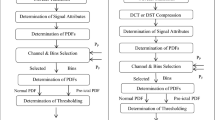Abstract
This paper presents two efficient frameworks for seizure detection and prediction that depend on statistical analysis. The common thread between them is the selection of certain attributes extracted from the electroencephalography (EEG) signals and the derivation of probability density functions (PDFs) of these attributes in two different types of activities of EEG signals. The first framework is for seizure detection based on scale-invariant feature transform (SIFT). Its idea is to choose some segments for normal and seizure activities. These segments are transformed to 2D matrices to be treated with the well-known SIFT. The feature key-points are extracted from those 2D matrices. The parameter that is used to discriminate between normal and seizure activities is the number of key-points. The PDFs of the number of key-points in cases of normal and seizure activities are estimated and a threshold value is used to classify any new segment as either a seizure or a normal segment. The other framework is for seizure prediction. The discrimination in this case is between normal and pre-ictal activities. A statistical treatment is performed on five attributes extracted from the wavelet transforms of different EEG segments for normal and pre-ictal activities. These attributes are amplitude, local mean, local variance, median and derivative. All PDFs of these attributes are estimated for normal and pre-ictal activities. Thresholds are set for all attributes. Decisions are taken based on these thresholds. Finally, a majority-voting strategy is used to merge decisions taken for all attributes.








































Similar content being viewed by others
Explore related subjects
Discover the latest articles and news from researchers in related subjects, suggested using machine learning.Availability of data and materials
All data are available upon request from the corresponding author.
References
Hassan AR, Haque MA (2015) Epilepsy and seizure detection using statistical features in the complete ensemble empirical mode decomposition domain. In: TENCON 2015—2015 IEEE Region 10 Conference
Eldeeb S, Sybeldon M, Susam B, Akcakaya M, Wozny T, Pan J, Richardson RM, Bagic A, Antony A (2021) Person-dependent seizure detection using statistical CUSUM detector: preliminary results. Expert Syst Appl 184:115551
Ravish D, Devi SS, Krishnamoorthy S, Karthikeyan M (2013) Detection of epileptic seizure in EEG recordings by spectral method and statistical analysis. J Appl Sci 13:207–219
Alam SM, Bhuiyan M (2011) Detection of epileptic seizures using chaotic and statistical features in the EMD Domai. In: India Conference (INDICON)
Kalin F, Akinci T, Türkpence D, Seker S, Korkmaz U (2020) Detection of epileptic seizure using STFT and statistical analysis. In: Vinjamuri R (ed) Advances in neural signal processing. IntechOpen, London
Emara H, Elwekeil M, Taha T, El-Fishawy A, El-Rabaie E-S, Otaiby T, Alshebeili S, Abd El-Samie F (2021) Hilbert transform and statistical analysis for channel selection and epileptic seizure prediction. Wirel Person Commun 116(2):3371–3395
Perez-Sanchez AV, Perez-Ramirez CA, Valtierra-Rodriguez M, Dominguez-Gonzalez A, Amezquita-Sanchez JP (2020) Wavelet transform-statistical time features-based methodology for epileptic seizure prediction using electrocardiogram signals. Mathematics 8(12):2125
Bedeeuzzaman M, Fathima T, Khan Y, Farooq O (2014) Seizure prediction using statistical dispersion measures of intracranial EEG. Biomed Signal Process Control 10:338–341
Lowe D (2004) Distinctive image features from scale-invariant key points. Int J Comput Vis 60(2):91–110
Abd El-Samie FE (2011) Information security for automatic speaker identification. In: Neustin A (ed). Springer
Yin L, Yang R, Gabbouj M, Neuvo Y (1996) Weighted median filters: a tutorial. IEEE Trans Circuits Syst II Analog Digit Signal Process 43(3):157–192
Scott D (2015) Multivariate density estimation: theory, practice, and visualization, 2nd edn. Wiley
Freedman D, Diaconis P (1981) On the histogram as a density estimator:L2 theory probability theory and related fields, vol 57. Springer, pp 453–476
CHB-MIT (2020) CHB-MIT Scalp EEG Database. Available: http://physionet.org/physiobank/database/chbmit/
Fornasier M, Rauhut H (2015) Compressive sensing. In: Scherzer O (ed) Handbook of mathematical methods in imaging. Springer, New York
Nahar P, Kolte M (2014) An introduction to compressive sensing and its application. Int J Sci Res Publ 4(6):2250–3153
Acknowledgements
Not applicable.
Funding
The authors did not receive support from any organization for the submitted work.
Author information
Authors and Affiliations
Contributions
All authors are equally contributed.
Corresponding author
Ethics declarations
Conflict of interest
The authors have no relevant financial or non-financial interests to disclose.
Ethics approval and consent to participate
All authors are contributing and accepting to submit the current work.
Consent for publication
All authors are accepting to submit and publish the submitted work.
Additional information
Publisher's Note
Springer Nature remains neutral with regard to jurisdictional claims in published maps and institutional affiliations.
Rights and permissions
Springer Nature or its licensor (e.g. a society or other partner) holds exclusive rights to this article under a publishing agreement with the author(s) or other rightsholder(s); author self-archiving of the accepted manuscript version of this article is solely governed by the terms of such publishing agreement and applicable law.
About this article
Cite this article
Khalil, A.A., El Sayeid, M.I., Ibrahim, F.E. et al. Efficient frameworks for statistical seizure detection and prediction. J Supercomput 79, 17824–17858 (2023). https://doi.org/10.1007/s11227-022-05030-0
Accepted:
Published:
Issue Date:
DOI: https://doi.org/10.1007/s11227-022-05030-0
Keywords
Profiles
- Ashraf A. M. Khalaf View author profile




